 An army marches on its stomach and so does a traveller. The first order of business, once acquaintance with hotel room amenities has been completed, is the locating of a decent place to eat.
An army marches on its stomach and so does a traveller. The first order of business, once acquaintance with hotel room amenities has been completed, is the locating of a decent place to eat.
No matter the bizarre schedule imposed by the airlines, once firmly on the ground a meal will be required within a few hours. It is all part of adjusting your clock to the local time. Walking, fresh air and real food, even if only a snack, will go a long way to break up the accretion of airplane food. Perhaps it does not affect you but for me inflight eating is a dynamic lesson in gestalt: the sum of those peanuts, yogurt and mystery omelet combines to form a mass far denser than the individual portions.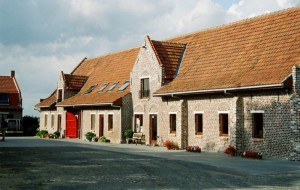
One amazing Bed and Breakfast in Belgium, located on the Passchendaele Ridge greets every guest with pie and coffee. And then the host sits down with you to find out what you want to see, your family history and who in the family fought in the 1st or 2nd world war.
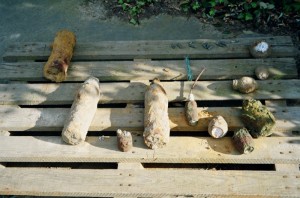
They’re not being nosy. This is the part of Europe every army from the Celts on down has found a reason to invade, march through and generally mess with the locals. WWI was a spectacular example in that it actually rearranged the physical topography, creating hills where none had been and turning flat land into small valleys.
It also created large areas that grow nothing but white crosses and red poppies.
We only had one night at Varlet Farm. A shortfall I hope to correct at some point in the future. For such a brief visit Charlotte insisted we drive the few miles in Ipers to watch the Last Post Ceremony at the Menin Gate (pronounced “Mine”, not like the old after shave and aperitif).
Ipers is more recognizable to some of us as ‘Ypres’. Most of Belgium was a mire during WWI. But Ypres held some special fascination for the military minds of that time. Almost to the point of obsessive. In the way of such thinking, to prove how much they wanted this lovely town, they obliterated as much of it as they possibly could on each visit.
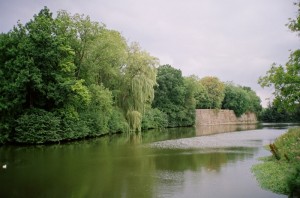 At the heart of Ipers stands the Menin Gate. It was a nice enough gate before the Germans came marching along but it was also a strategic bridge connecting the muck on one side to the rubble on the other. After the smoke cleared and the guns were finally silenced, it was rebuilt with a purpose.
At the heart of Ipers stands the Menin Gate. It was a nice enough gate before the Germans came marching along but it was also a strategic bridge connecting the muck on one side to the rubble on the other. After the smoke cleared and the guns were finally silenced, it was rebuilt with a purpose.
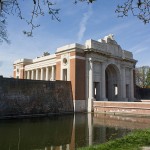 A substantial concrete arch now spans the river. It looks like a church from the outside. Carved into it’s walls and roof, on every available surface are the names of soldiers we would now call MIA. “Here are recorded names of officers and men who fell in Ypres Salient, but to whom the fortune of war denied the known and honoured burial given to their comrades in death”.
A substantial concrete arch now spans the river. It looks like a church from the outside. Carved into it’s walls and roof, on every available surface are the names of soldiers we would now call MIA. “Here are recorded names of officers and men who fell in Ypres Salient, but to whom the fortune of war denied the known and honoured burial given to their comrades in death”.
There are 54,896 names on these walls. Now there are a few more things to bear in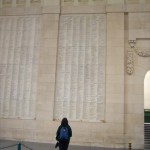 mind, while your brain tries to process that number. These are only those who were on record as being sent into battle in the area around Ipers. This does not include those who marched through this area and were considerate enough to be found sufficiently intact for a marked grave.
mind, while your brain tries to process that number. These are only those who were on record as being sent into battle in the area around Ipers. This does not include those who marched through this area and were considerate enough to be found sufficiently intact for a marked grave.
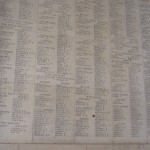 Also this only covers the years 1914 to August 15, 1917. That was all the room available on the memorial. The names of a further 34,984 souls who marched into Ypres August 16, 1917 until November 11, 1918 and were never found are inscribed on another memorial nearby, the Tyne Cot memorial.
Also this only covers the years 1914 to August 15, 1917. That was all the room available on the memorial. The names of a further 34,984 souls who marched into Ypres August 16, 1917 until November 11, 1918 and were never found are inscribed on another memorial nearby, the Tyne Cot memorial.
Oh, and the Menin Gate and the Tyne Cot Memorial do not include the soldiers from New Zealand or Newfoundland or U.S. regiments.
Now consider the Menin Gate does not include those souls lost by the other side in the same battles.
Every day at 8:00, the local fire brigade performs the Last Post ceremony. A small 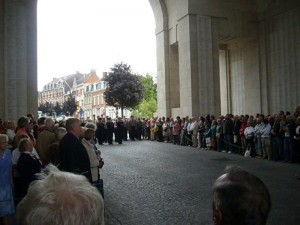 band frequently accompanied by visiting military groups, boy scouts, girl guides and veterans. The police stop traffic, the buglers and honour guard march onto the gate. They play The Last Post and Reveille and let the notes echo for the 2 minutes of silence. It has been done every night since July 27, 1928.
band frequently accompanied by visiting military groups, boy scouts, girl guides and veterans. The police stop traffic, the buglers and honour guard march onto the gate. They play The Last Post and Reveille and let the notes echo for the 2 minutes of silence. It has been done every night since July 27, 1928.
Without fail.
When the Germans made a return visit in 1940 a group in Surrey, England took it up without any interruptions. As soon as the area around the Menin Gate was cleared of the occupying force, the Ipers fire brigade resumed it’s duties, marching onto the gate on time and playing the Last Post while fighting continued in the rest of the town.
I remember pie and bugles when I think of Belgium.
And waffles with chocolate and strawberries for supper. For every tear, there must be a smile.
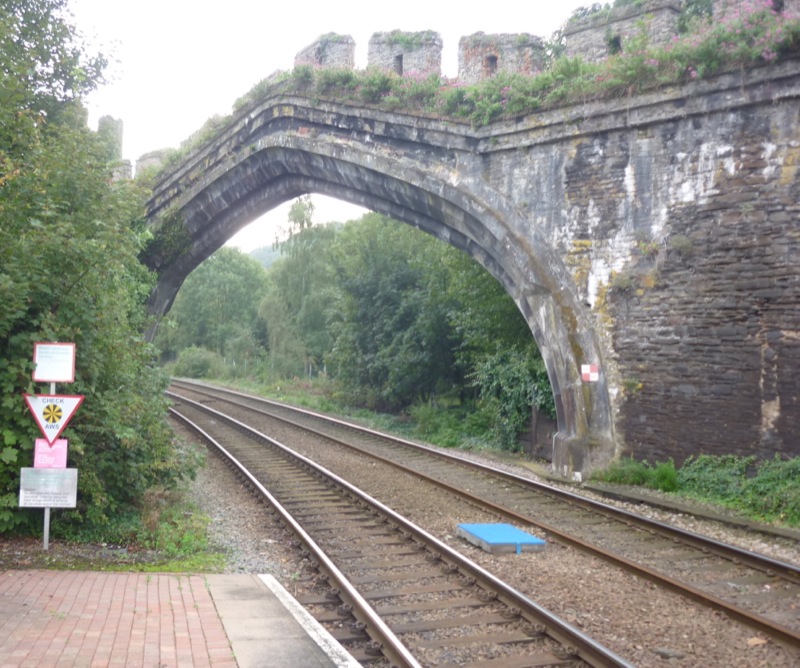
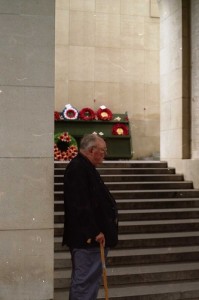
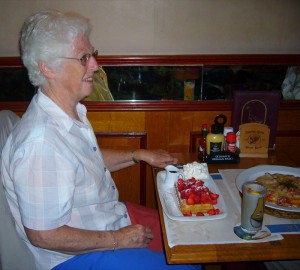
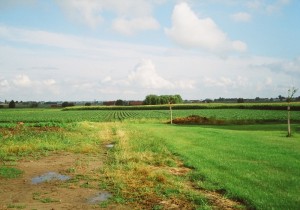
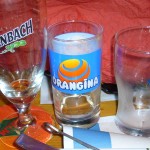
great article – I’ve fwd it to a friend who lived there during WWII
Thanks, Suzanne. And thank you for sharing. Good girl.